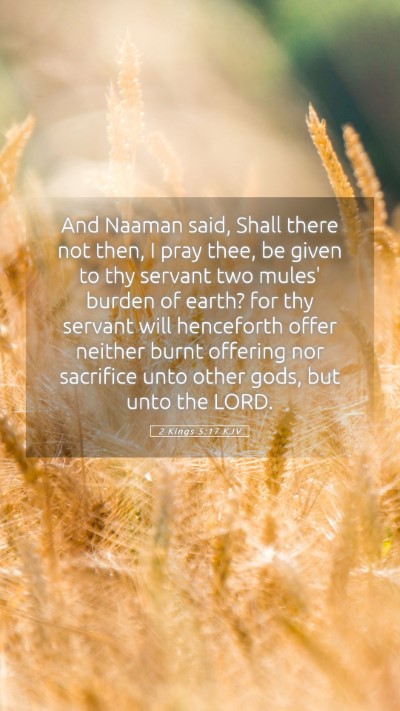Understanding 2 Kings 5:17
Scripture Reference: 2 Kings 5:17: "And Naaman said, 'If not, please let there be given to your servant two mule loads of earth, for your servant will no longer offer either burnt offering or sacrifice to other gods, but to the Lord.'"
Overview of the Verse
This verse captures a pivotal moment in the narrative of Naaman, a Syrian commander who was healed of leprosy by the prophet Elisha. After his healing, Naaman expresses his desire to dedicate his offerings to Yahweh alone, rejecting his former practices of idol worship. This signifies a significant transformation in Naaman's understanding of God.
Bible Verse Meanings
-
Recognition of God:
Naaman's request for soil symbolizes his acknowledgment of the true God, which contrasts with the false deities of his homeland. This act signifies a mental and spiritual shift, embracing a new faith.
-
The Significance of Earth:
In ancient Near Eastern culture, the soil was considered sacred. By taking the earth back with him, Naaman demonstrates his intention to create a space to worship Yahweh, signifying his commitment to serve the one true God.
-
Rejection of Past Practices:
Naaman’s statement reflects a resolve to abandon idolatry, indicating a sincere conversion and a desire to live according to Yahweh’s commandments.
Bible Verse Interpretations
Commentators emphasize Naaman's transformation from a powerful military leader to a humble servant of God. Matthew Henry notes that this highlights God's mercy even to those outside Israel, showcasing the universal applicability of God's grace.
Adam Clarke adds that Naaman's decision to worship only Yahweh also indicates a pivotal turning point in the biblical narrative: the inclusion of Gentiles into the community of faith. This theme is recurrent throughout scripture.
Biblical Exegesis
Exegesis of this passage suggests that Naaman's actions reflect deeper theological implications regarding worship and devotion. Albert Barnes elaborates on how Naaman's experience with Yahweh starkly contrasts with the polytheistic practices of his background. The very act of transporting soil implies a need for a tangible connection to the divine.
Application of the Verse
This scripture invites readers to consider their own practices of worship and allegiance. It speaks to the importance of our surroundings in nurturing our faith and illustrates that worship can occur anywhere, as long as it is directed toward God.
Related Bible Cross References
- Isaiah 19:21: "And the Lord will make Himself known to the Egyptians; the Egyptians will know the Lord in that day..."
- Romans 10:12: "For there is no distinction between Jew and Greek; for the same Lord is Lord of all, abounding in riches for all who call on Him."
- Acts 10:1-2: "Now there was a man at Caesarea named Cornelius, a centurion of what was called the Italian cohort, a devout man and one who feared God with all his household..."
Insights for Bible Study
This verse is rich for study in both personal and group contexts. It can serve as a starting point for discussions in Bible study groups focused on conversion, worship practices, and the inclusion of Gentiles in the faith. Utilizing Bible study tools can help deepen understanding of the historical and cultural context surrounding Naaman’s story.
In-depth Bible Verse Analysis
For those seeking to conduct an in-depth analysis, consider examining the historical context of Naaman's character as a military leader in Syria, and how his healing by a Jewish prophet serves as a precursor to the Gospel's revelation to the nations in the New Testament. This offers a link between the Old Testament and the expansive message of grace found in Jesus Christ.
Conclusion
2 Kings 5:17 encapsulates a crucial moment of transformation and devotion that extends beyond Naaman’s personal narrative, inviting all to explore the broader themes of worship and faithfulness to God. It challenges believers to reflect on their own lives and consider their dedication to following the Lord alone.


